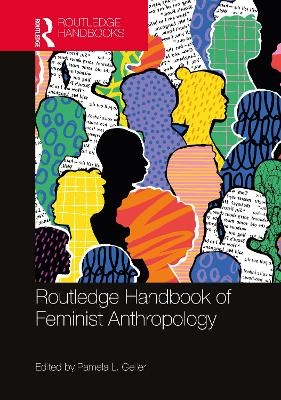
The Routledge Handbook of Feminist Anthropology
Routledge (Verlag)
978-1-032-29836-8 (ISBN)
- Noch nicht erschienen (ca. Dezember 2024)
- Versandkostenfrei
- Auch auf Rechnung
- Artikel merken
The Routledge Handbook of Feminist Anthropology is a comprehensive inter- and intradisciplinary survey of the field of feminist anthropology. It has at its core a focus on raising consciousness and communicating information about gender inequities, suffering, and precarity, as well as furthering a praxis informed by intersectionality, decolonial intent, and compassion.
Divided into three clear parts and comprising 34 chapters by an international team of contributors, the Handbook addresses topics in the following key areas:
resisting violence
communicating creatively
labor
migration and displacement
health and disease
reproduction
intersectionality
decolonial work.
The collection assesses the field at an interesting moment in time—one defined by social justice and populist movements gone global; once and future pandemics; extreme environmental disasters; and neoliberalism interrupted. How do gender, sex, and sexuality intersect with these phenomena? In answer, contributors to this volume put a heterogeneous anthropological approach in place; they advance interdisciplinary conversations, as well as renew a commitment to intradisciplinary dialogue.
The Routledge Handbook of Feminist Anthropology is essential reading for students, researchers, and instructors in anthropology, and will also be of interest to those in related disciplines such as gender studies, queer studies, economics, biomedicine, political science, sociology, geography, and science and technology studies.
Pamela L. Geller is Associate Professor of Anthropology at the University of Miami, USA. She is the author of The Bioarchaeology of Social-Sexual Lives: Queering Common Sense about Sex, Gender, and Sexuality (2017), Theorizing Bioarchaeology (2021), and Becoming Object: The Sociopolitics of the Samuel George Morton Cranial Collection (2024). Geller also writes for lay audiences; her essays have appeared in Slate, Miami Herald, and The New York Times.
PART I Consciousness-raising; On resisting violence; 1. Sexual violence as professional misconduct in the practice of anthropology M. Gabriela Torres; 2 Sexual harassment in archaeology: Taking stock and moving forward Amber M. VanDerwarker; 3Neocolonialism and palaeoanthropology: Reflections from a white feminist in Southern Africa Rebecca R. Ackermann; 4 Whisper networks and woke networks Anna Babel and Ashlee Dauphinais Civitello; 5 Gender, violence, and memory Shahla Talebi; 6 Feminicide/femicide: A global crisis Brigittine M. French;On communicating creatively; 7 Feminism and digital archaeology Katherine Cook; 8 Ethnographic poetry as a decolonial feminist praxis Ather Zia; 9 Visualizing ethnography: Feminist praxis in anthropological film Ethnocine Collective; 10 Comics, graphic novels, and feminism Marie-Eve Carrier-Moisan; PART II Precarity; On labor;11 Demystifying the sexual division of labor: A look from human evolution Danae G. Khorasani and Sang-Hee Lee; 12 Trauma and past lives Rebecca C. Redfern and Linda Fibiger; 13 The historical archaeology of sex work Kristen R. Fellows; 14 Unveiling the engima of culture: Reflections on gendered precarious work in China and Japan Huiyan Fu; 15 The gendered globalization of labor Carla Freeman and Hunter Akridge;On migration and displacement;16 Global mobilities, intimate moments: Embodying nineteenth-century domestic labor Alanna L. Warner-Smith; 17 Blood, mud, and mucking around with waste: Properties of reworlding postindustrial space Shannon A. Novak; 18 Feminist takes and contributions to refugee and displacement studies Katarzyna Grabska; 19 Discourse and the gendered racialization of displacement Hilary Parsons Dick, Júlia Da Silva, Madeline Lynch, and Maria Terrinoni; On health and disease; 20 Increased female mortality after environmental disaster: Perspectives from primate studies Alison M. Behie;21 Feminist anthropology and epidemics Shelley Lees; 22 “Studying up” health inequities Sandhya Ganapthy; 23 Reframing old bones and old stories: Gendered patterns of health and disease in the past Sabrina C. Agarwal; On reproduction; 24 Mothers and infants: Materializing maternal health and reproductive loss in the past Rebecca Gowland; 25 Reproductive oppression at the intersections: An archaeology of Hollywood Plantation Jodi A. Barnes; 26 Perspectives on intersectionality from public health and medical anthropology to promote health equity and reproductive justice Annie Preaux and Arachu Castro; 27 Racial disparities and racism in reproductive experiences Chiara Quagliariello,Veronica Miranda, and Mounia El Kotni; 28 Technology, health, and gender Cecilia McCallum, Ana Paula dos Reis, and Mariana Pitta Lima;PART III Praxis; On intersectionality; 29 Archaeology, intersectionally: Past lives and present-day sociopolitics Anna S. Agbe-Davies; 30 Ethnographing intersectional inequalities Carmen Gregorio Gil and Mara Viveros-Vigoya; 31 On disinheritance, intersectionality, and environment: Zora Neale Huston’s Florida Writers’ Project fieldnotes Sarah E. Vaughn; On decolonial work; 32 Mothering in the decolonial moment Ziyanda Majombozi; 33 Decolonizing masculinities Sakhumzi Mfecane; 34 Decolonizing methods in feminist ethnography: Reflections from Andean Peru and coastal Ecuador Florence E. Babb and Maja Jeranko
| Erscheint lt. Verlag | 23.12.2024 |
|---|---|
| Reihe/Serie | Routledge Handbooks of Gender and Sexuality |
| Zusatzinfo | 9 Tables, black and white; 2 Line drawings, black and white; 38 Halftones, black and white; 40 Illustrations, black and white |
| Verlagsort | London |
| Sprache | englisch |
| Maße | 174 x 246 mm |
| Themenwelt | Sozialwissenschaften ► Ethnologie |
| Sozialwissenschaften ► Politik / Verwaltung ► Politische Theorie | |
| Sozialwissenschaften ► Soziologie | |
| ISBN-10 | 1-032-29836-7 / 1032298367 |
| ISBN-13 | 978-1-032-29836-8 / 9781032298368 |
| Zustand | Neuware |
| Haben Sie eine Frage zum Produkt? |
aus dem Bereich


